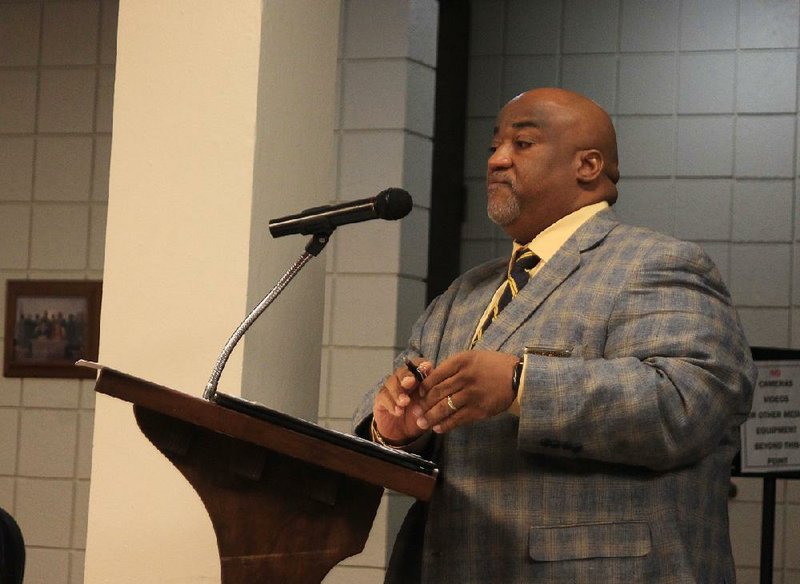PINE BLUFF -- Police and fire personnel in Jefferson County will soon be equipped with the lifesaving opioid antidote Narcan, thanks to a grant program from Blue and You for a Healthier Arkansas, according to the University of Arkansas Criminal Justice Institute in Little Rock.
Narcan, the brand name for the opioid antagonist naloxone, is being used by first responders around the country as an antidote for opioid overdose.
Jefferson County agencies that will receive Narcan kits and training in how to use them are the Pine Bluff Police Department (140 kits), the Pine Bluff Fire Department (100 kits), the Jefferson County sheriff's office (100 kits), and the University of Arkansas at Pine Bluff Police Department (19 kits).
Each kit contains two 4-milligram doses of Narcan, a pair of nitrile gloves, a CPR face shield, hand sanitizer and a reference card with contact information for substance-abuse treatment entities.
Under the terms of a $150,000 grant, 1,400 first responders with 35 agencies in Arkansas will receive training and Narcan kits this year from the Criminal Justice Institute. Last year, the institute equipped 1,300 officers in 16 agencies in the state with Narcan kits.
Agencies in Arkansas already using Narcan include police departments in Little Rock, Jacksonville, Benton and Rogers; sheriff's offices in Pulaski, Saline and Washington counties; as well as the Arkansas State Police.
"Our goal is to get as many kits into the hands of as many first responders as we possibly can," said Dr. Cheryl May, director of the Criminal Justice Institute.
According to the U.S. Centers for Disease Control and Prevention, 70,237 drug overdose deaths occurred in the United States in 2017, an increase of nearly 10 percent over the previous year. Opioids were involved in 47,600 overdose deaths nationally in 2017, accounting for nearly 68 percent of all drug overdose deaths.
Arkansas has the second-highest level of opioid prescriptions in the nation, at 114.6 prescriptions written per 100,000 population in 2016, according to the CDC. The state with the highest level of prescriptions is Alabama, with 121 prescriptions per 100,000 population.
Opioid deaths in Arkansas increased from about 12 per 100,000 population to about 14 per 100,000 population between 2010 and 2015. Overall drug overdose deaths in Arkansas increased from 113 in 1999 to 446 in 2017, according to the CDC.
Under the grant, designated agencies are required to identify and send a program coordinator to a training seminar , sign a letter of agreement between each agency and the institute, and receive and abide by a model policy and medical director memorandum of understanding.
All personnel issued Narcan kits must be CPR certified or trained in CPR, and participating agencies must meet mandatory reporting requirements, maintain a professional affiliation with a medical control physician, and ensure that personnel responsible for administering Narcan be trained in its use.
Pine Bluff Fire Chief Shauwn Howell said he and two members of his training division would attend a training session.
"This is a new program involving multiple departments as part of a larger grant program, so I want to make sure I have a clear understanding of just what is involved and what is required," Howell said.
The chief said his crews deal with many types of emergencies, which requires his department to be prepared for a range of situations.
"We might have a call to a fire, then turn around and deal with a car accident, CPR, then an overdose, so we have to be as prepared as we can for whatever might come our way in a given day," Howell said. "It makes us have to be cross-trained to be prepared for many types of emergencies."
Pine Bluff Police Chief Kelvin Sergeant said he would send one officer to the training session and plans to have other officers complete online training to qualify for Narcan kits.
"I currently have 123 officers, so I'll get as many officers as I can trained," Sergeant said. "That way we can give every officer a Narcan kit. That will be a tremendous help to us."
One factor driving the increase in opioid deaths, May said, is the importation of the synthetic opioid fentanyl, most of which she said is manufactured in China and comes to the United States through ports of entry along the U.S.-Mexico border.
"Fentanyl is legitimately used by physicians to treat extreme pain, such as what is experienced by end-stage cancer patients," May said. "But drug dealers are using it to [mix into] heroin and other drugs -- methamphetamine, marijuana, K2, you name it -- and because it's so powerful, people are dying from it."
Sergeant said Pine Bluff experiences high levels of drug use, and much of it involves opioids. He said he hasn't heard there is much of a problem so far with fentanyl in the city, but he expects that to change.
"I've not heard my officers talking about it, but it's coming," he said. "If it's everywhere, I'm sure we're experiencing it on some level but just not widespread at the moment."
State Desk on 02/24/2019

